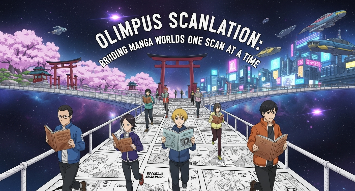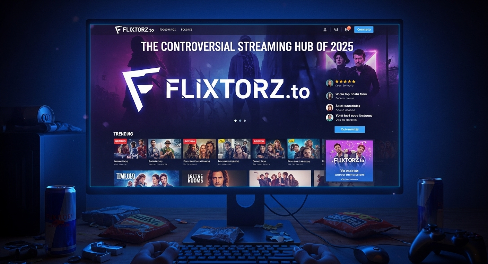
Olimpus Scanlation: Bridging Manga Worlds One Scan at a Time
Introduction
Imagine a world where every manga, regardless of licensing, finds its way into the hands of eager readers. That world exists today thanks to dedicated fan‐driven groups, and at the forefront stands olimpus scanlation. Born from a passion for storytelling and a desire to share hidden gems, this scanlation collective has made high‐quality translations accessible to fans worldwide. In this article, we’ll dive deep into the origins, workflows, and broader impact of olimpus scanlation. You’ll discover how it operates, why its contributions matter in 2025’s booming manga market, and what ethical questions it raises. By the end, you’ll understand why olimpus scanlation has become an indispensable bridge between Japanese creators and global audiences.
Understanding Scanlation and the Rise of Olimpus Scanlation
Scanlation—a portmanteau of “scan” and “translation”—refers to the fan‐led process of digitizing, translating, and editing comics from one language into another. It’s most commonly applied to Japanese manga, but also extends to Korean manhwa and Chinese manhua. Unlike official translations, scanlation work is carried out without express permission from copyright holders, often skirting legal boundaries to fill gaps in availability Wikipedia. In a landscape where some series never receive licensed translations outside Japan, scanlation groups serve as the only avenue for global fans to experience new chapters as soon as they’re released.
Among these groups, olimpus scanlation has carved out a reputation for both speed and accuracy. Launched in late 2023 by a small team of bilingual enthusiasts, it quickly grew into a comprehensive operation featuring translators, editors, proofreaders, and quality‐control experts. Their stated mission is to champion titles that lack official releases in English, delivering polished chapters within hours of each Japanese volume’s release LinkedIn. For readers hungry for the latest developments in their favorite series, olimpus scanlation is now synonymous with reliability and fidelity.
The Genesis of Olimpus Scanlation
The story of olimpus scanlation began when two university friends, both avid manga collectors, grew frustrated by the months—or even years—it took for certain titles to be licensed abroad. Pooling their language skills and technical know‐how, they scanned raw pages from their own Japanese volumes and shared early translations on a small Discord server. Word spread rapidly; within six months, the team expanded to include dedicated roles for translation, typesetting, and digital cleanup LinkedIn. Today, olimpus scanlation operates much like a micro‐publisher, with a clear workflow and a volunteer base numbering over fifty contributors worldwide.
Scanlation vs. Official Translation: A Comparative Overview
| Aspect | Olimpus Scanlation | Official Translation |
|---|---|---|
| Availability | Immediate, global reach | Gradual, region‑locked |
| Speed | Chapters released hours after Japan | Often delayed by months due to licensing |
| Cost | Free to readers | Paid volumes or subscription required |
| Accuracy & Nuance | High commitment to cultural fidelity | Varies by publisher; can be overly localized |
| Legality | Operates in a legal gray area | Fully licensed and sanctioned |
This table highlights why olimpus scanlation has become a go‑to source for many readers—even as official translations continue to improve in quality and breadth.
The Workflow Behind Olimpus Scanlation
Success in scanlation hinges on a meticulous, multi‐stage pipeline. By understanding each step, you’ll see why olimpus scanlation maintains both speed and high standards.
Scanning and Cleaning Process
-
Raw Scanning
Using high‐resolution flatbed scanners, team members digitize each manga page at 600 DPI or higher. This level of detail ensures crisp line art and preserves tiny visual cues essential to the storytelling. -
Digital Cleanup
After scanning, images pass through a cleaning phase. Volunteers use software like Photoshop and Clip Studio Paint to remove blemishes (speckles, dust, and page curl), balance contrast, and isolate speech bubbles. -
Preparation for Typesetting
Once cleaned, layers containing Japanese text are carefully erased, leaving transparent bubbles. This creates a blank canvas for English lettering without disturbing background art.
By standardizing file naming and folder structures, olimpus scanlation avoids confusion and speeds up collaboration, even when contributors are spread across multiple time zones.
Translation, Editing, and Quality Control
-
Initial Translation
Bilingual translators convert the Japanese dialogue into English, striving to maintain tone, humor, and cultural references. They often consult glossaries specific to manga tropes to keep terminology consistent. -
Editing & Proofreading
Translations are passed to a separate team of editors—native English speakers well‐versed in manga culture. Editors refine phrasing, spot typos, and ensure dialogue reads naturally for the target audience. -
Typesetting & Lettering
Using specialized fonts that match the original style, typesetters carefully place text within speech bubbles. They adjust font sizes and balloon shapes to preserve readability and visual flow. -
Final Quality Check
A dedicated QC team reviews each page, checking for consistency in terminology, correct placement of sound effects (SFX), and overall layout integrity. Only after passing this stage does a chapter get scheduled for release.
This multi‐layered approach mirrors professional publishing pipelines, resulting in a polished end product that rivals licensed volumes in presentation.
Impact on Manga Fandom and Industry
As the global manga market continues its rapid expansion—estimated at USD 15.6 billion in 2024 and projected to reach USD 18.0 billion by 2025 at an 18.7% CAGR—scanlation plays a pivotal role in meeting localized demand, especially in regions with limited official distribution Grand View Research.
Expanding Access and Community Building
-
Broader Reach
Fans in countries without official licensing (e.g., parts of Eastern Europe, Southeast Asia) rely on scanlation groups like olimpus scanlation to access new titles within days rather than years. -
Online Hubs
Community platforms—including Discord servers, Reddit threads, and dedicated forums—foster vibrant discussions around scanlation releases. Olimpus scanlation’s own Discord boasts over 10,000 active members engaged in chapter discussions, polls for upcoming projects, and fan art showcases. -
Cultivating New Readers
By exposing audiences to lesser‑known works—ranging from niche historical dramas to avant‑garde one‑shots—olimpus scanlation drives interest in genres that might otherwise remain obscure.
This community focus transforms passive readers into active participants, strengthening fandom bonds and inspiring new creative contributions like fan art, AMVs, and even original doujinshi.
Ethical Considerations and Legal Gray Areas
Operating without formal licensing, scanlation groups inhabit a complex legal territory. While some industry insiders view scanlation as a form of piracy—attributing losses up to ¥800 billion (around USD 5.8 billion) annually to unauthorized distribution—others recognize its role in promoting titles ahead of official releases Medium. Key principles that many groups, including olimpus scanlation, adhere to include:
-
Non‑Commercial Ethos
No ads, paywalls, or donations tied directly to project releases. All work remains volunteer-based. -
Cease‑Upon‑License
Projects are discontinued once a title receives an official English licensing, encouraging readers to purchase authorized editions. -
Promoting Creator Support
Release notes often include links to official publishers and legal reading platforms, urging fans to support mangaka through purchases.
By balancing accessibility with respect for creators, olimpus scanlation arguably amplifies global interest and drives sales for officially licensed manga.
Why Olimpus Scanlation Stands Out
With dozens of scanlation groups operating worldwide, why has olimpus scanlation achieved such prominence? The answer lies in a blend of speed, quality, and genuine community engagement.
Speed and Quality
-
Rapid Turnaround
Leveraging a well‐coordinated pipeline and round‑the‑clock volunteers, olimpus scanlation consistently releases chapters within 12–24 hours of the original Japanese publication. -
High Fidelity
Translator‐editor teams work closely to preserve stylistic nuances—honoring honorifics, puns, and cultural jokes—ensuring readers experience the story as authentically as possible. -
Consistent Standards
Rigorous QC protocols, a curated glossary, and shared typesetting templates maintain uniformity across all releases, regardless of genre or project size.
This combination of speed and meticulous attention to detail mirrors professional localization studios, earning olimpus scanlation accolades from both casual fans and industry commentators.
Community Engagement and Volunteer Ethos
-
Interactive Polls
Monthly polls let readers vote on upcoming projects, fostering a sense of ownership and ensuring resources align with fan demand. -
Contributor Spotlights
Regular blog posts introduce new translators, editors, and artists, highlighting their talents and deepening personal connections within the community. -
Skill Development
Olimpus scanlation offers mentorship for aspiring translators and graphic editors, hosting workshops on Japanese–English translation techniques and digital cleanup tools.
By investing in volunteers’ growth and listening to reader feedback, olimpus scanlation nurtures a sustainable ecosystem where passion and professionalism coexist.
Conclusion
In an era where digital access reigns supreme, olimpus scanlation has emerged as a shining example of what fan-driven communities can achieve. Through a structured workflow, unwavering commitment to quality, and a deep respect for both creators and readers, Olimpus Scanlation bridges linguistic and geographic divides. It enriches the manga landscape by ensuring that even titles with limited official distribution reach a global audience.
Whether you’re a seasoned manga enthusiast or a newcomer curious about scanlation, olimpus scanlation offers an unparalleled gateway to explore fresh stories. If you haven’t yet experienced their releases, visit their official Discord or fan forums to join a thriving community of creators and readers united by a shared love of manga.
FAQ
Q1: Is olimpus scanlation legal?
Scanlation itself exists in a legal gray area: while it involves unauthorized distribution, many groups operate non‑commercially and halt projects once official licenses are secured. Always check local copyright laws before downloading fan translations.
Q2: How can I read olimpus scanlation releases?
Olimpus scanlation primarily distributes chapters via their Discord server and a dedicated website. Look for official links shared on social media to avoid malicious mirrors.
Q3: Are the translations accurate?
Yes. Olimpus scanlation employs bilingual volunteers and professional editors to ensure translations capture both literal meaning and cultural nuance, rivaling many official releases.
Q4: Can I contribute to olimpus scanlation?
Absolutely. The group frequently seeks volunteers for translation, typesetting, editing, and quality control. Keep an eye on their Discord or forums for open recruitment calls.
Q5: What happens when a title gets officially licensed?
Olimpus scanlation ceases its project for that title and encourages readers to support the official release through legal purchasing platforms.
Q6: Does scanlation hurt manga sales?
Opinions vary. While unauthorized releases can dissuade some from buying official editions, scanlation also raises visibility and interest—often leading fans to purchase volumes once available officially.
We hope this deep dive into olimpus scanlation clarifies how this passionate collective continues to expand manga’s global reach—and why it remains an integral part of fandom culture in 2025 and beyond.





